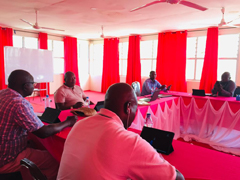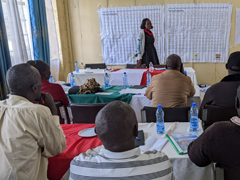Project News volume 23 (2022-06-21)
Hybrid gender training combining online and face-to-face first in the Project was held!
The Project has been working for innovation by distributing tablets to county officers, conducting SHEP understanding exam using Google Forms and making training paperless, etc. This time, the Project made part of the gender training online, and realized the training in which county officers participated by using tablets.
Previously, the gender training was a five-day face-to-face training, but it has been changed to a four-day program with one-day online and three-day face-to-face training. Gender training at Kenya SHEP consists of three components; 1) gender analysis aimed at deepening mutual understanding of roles and situations of men and women and improving the efficiency of agricultural management, 2) development of farm budget plan and 3) group empowerment indicator to check group maturity.
The Project created video materials of 5 tools; 1) productive / reproductive analysis, 2) resource access / control analysis, and 3) daily activity analysis, those three tools are used for gender analysis, and 4) farm family budgeting table and 5) group empowerment indicator checklist. In the online training, participants watched the video materials, followed by Q&A session and online test for understanding were conducted. Though it was the first attempt, the training went well since the Project was carefully communicating with the sub-counties and confirming the venue settings, Wi-Fi connection, and communication using the WhatsApp group.
The following face-to-face training is a program in which extension officers practice to actually explain the tools learned in the online training and learn how to facilitate problem solving. Participating county officers acted as farmers, were divided into men and women and filled out gender analysis tools. After that, the extension officer assigned as a facilitator for each session facilitated the development of an action plan for overcoming problems identified in the analysis tool. Facilitator is expected to encourage constructive dialogue between men and women to review wasteful and burdensome parts of daily activities and to improve the efficiency of agricultural management rather than complaining about each other. Through the face-to-face training, participants made a new discovery themselves that "I realized that men and women are spending for the same item, and it is important to discuss together to manage household expenditure efficiently".
After the gender training, extension officers will visit target farmer groups, explain gender analysis tools and support developing a gender activity plan. The Project continues to monitor the activities of extension officers!

Online gender training

Face to face gender training
